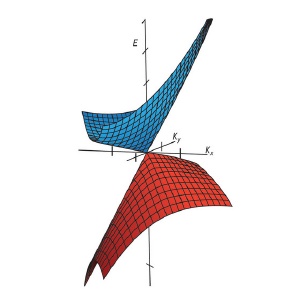Jun 18 2009
Researchers from the RIKEN Advanced Science Institute in Wako, in collaboration with colleagues from Toho University, Japan, have discovered an organic compound, a-(BEDT-TTF)2I3, that exhibits a rare feature: the compound's electrons behave like particles without mass, so they do not obey Newton's second law of motion*. This is the first 3D material where all requirements for massless systems are confirmed.
 Two-dimensional plot of energy E versus momentum k of the electron states in á-(BEDT-TTF)2I3. The plot shows the lack of a gap between the upper (blue) and lower (red) energy states. In its diagonal cross-section, the plot also shows the linear dependence of energy on momentum. Note that the origins of the axes are taken at the position of the contact point.
Two-dimensional plot of energy E versus momentum k of the electron states in á-(BEDT-TTF)2I3. The plot shows the lack of a gap between the upper (blue) and lower (red) energy states. In its diagonal cross-section, the plot also shows the linear dependence of energy on momentum. Note that the origins of the axes are taken at the position of the contact point.
In most materials, electrons do follow this law of motion, such that the energy of an electron is proportional to the square of its momentum. There are only a few known 2D systems, notably graphene, where electrons behave in a fundamentally different way. They appear to have no mass when propagating through the material, so the relationship between their energy and momentum is linear.
Some 3D materials also have massless electrons, but the electrons in these materials have a gap between their energy states that makes them behave more like semiconductors than metals. The zero gap is a prerequisite for fully massless systems. In a-(BEDT-TTF)2I3, not only do the electrons appear massless, there is also no gap in the energetic structure. “This is the first known three-dimensional material with zero gap,” says Naoya Tajima from the research team.
In some respects, a-(BEDT-TTF)2I3 resembles a 2D material, as it is composed of two different layers of conducting BEDT-TTF molecules and insulating I3- anions. The system remains metallic down to the low temperatures where electrons are massless, but only under the application of high pressure.
To produce watertight evidence for massless electrons in this system, the researchers applied strong magnetic fields. The linear dependence of energy on momentum became apparent from these experiments and, more importantly, the experiments provided direct evidence for the zero energy gap.
In the presence of a magnetic field applied perpendicularly to the layers, an electronic state forms at zero energy. This state is occupied by electrons only when the band gap is zero. The higher the magnetic field, the more electrons are in this state, thus an increasingly reduced electrical resistance is predicted. Accordingly, the researchers observed in their experiments that conductivity decreased with increasing magnetic fields in the perpendicular direction.
Armed with this evidence, further intriguing effects are bound to arise from these systems. “We recently discovered [other] novel phenomena characteristic particular to these three-dimensional systems,” notes Tajima. A large class of related organic molecules seems destined to provide further examples of massless systems and the discovery of related unusual electronic properties.
*Tajima, N., Sugawara, S., Kato, R., Nishio, Y. & Kajita, K. Effect of the zero-mode Landau level on interlayer magnetoresistance in multilayer massless Dirac fermion systems. Physical Review Letters 102, 176403 (2009).